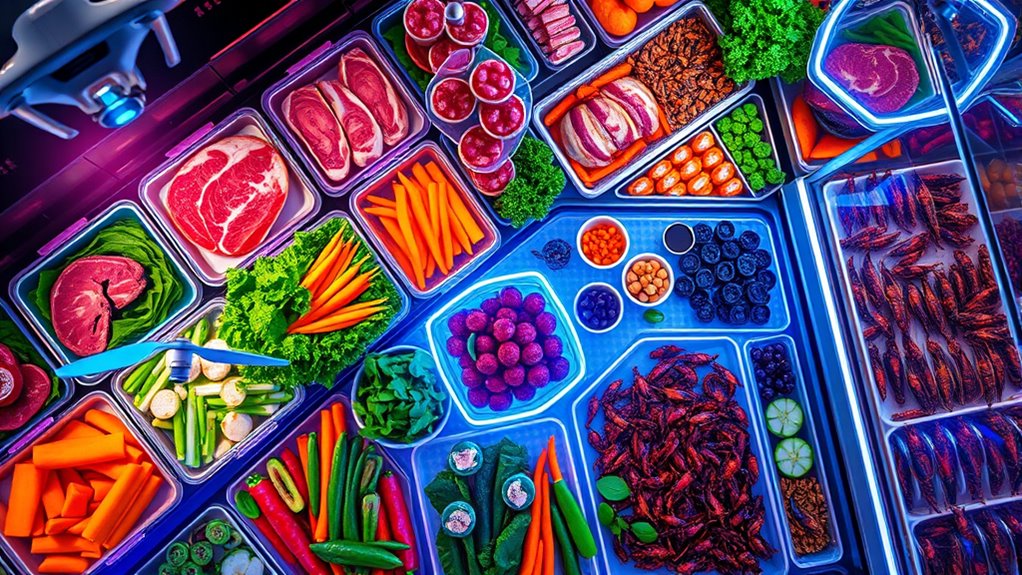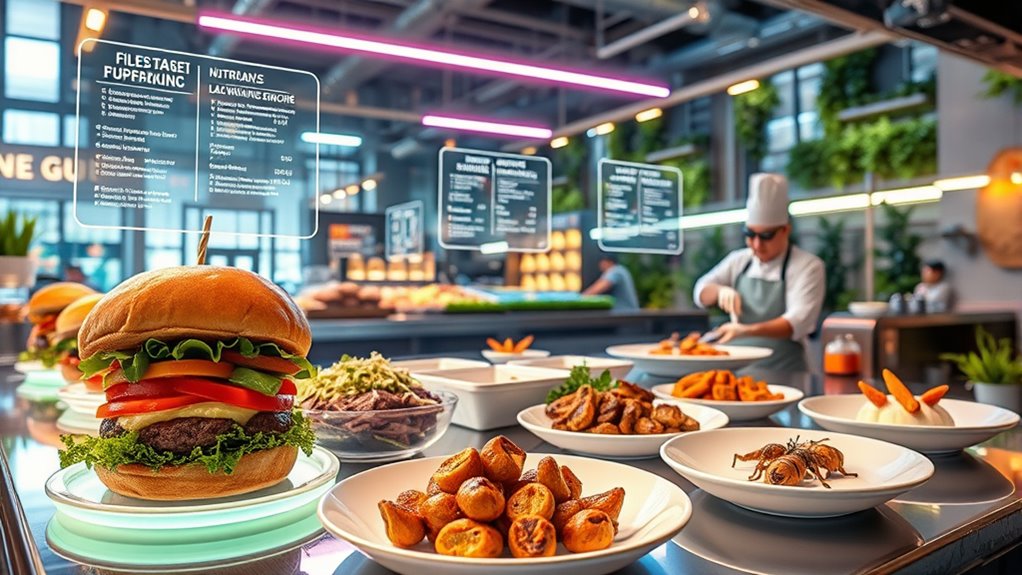The future of food is about blending cultures, embracing plant-based options, and focusing on health and sustainability. You’re likely to see more fusion dishes, fermented foods, and innovations like lab-grown meat and vertical farms. These trends aim to make global cuisines more diverse, natural, and eco-friendly. As food evolves, you’ll get to experience exciting flavors and ethical choices that connect you with traditions worldwide. Keep exploring to discover how these changes shape what’s on your plate.
Key Takeaways
- Global tastes are blending through cultural fusion, making diverse cuisines more accessible and promoting culinary exploration.
- Plant-based foods are expanding, offering healthier, sustainable alternatives that reduce environmental impact.
- Fermentation and gut health are driving popularity of probiotic-rich foods like kimchi, kombucha, and yogurt.
- Technological innovations such as lab-grown meat and vertical farms are transforming sustainable food production.
- Future cuisines will feature diverse, multicultural dishes that celebrate innovation, sustainability, and culinary curiosity.

As global tastes evolve, new trends are transforming the way we experience food across cultures. You’re likely noticing how dishes from different parts of the world are becoming more accessible, blending flavors and techniques in innovative ways. This shift isn’t just about trying new foods; it’s about a deeper integration of diverse culinary traditions into your everyday life.
One major trend shaping the future of food is the rise of plant-based cuisine. You’re probably seeing more plant-based options on menus, reflecting a growing concern for health, sustainability, and animal welfare. These alternatives aren’t only healthier but also more environmentally friendly, reducing the carbon footprint associated with traditional meat production.
Plant-based options are now mainstream, supporting health, sustainability, and animal welfare.
As a consumer, you now have the power to choose dishes made from lentils, jackfruit, tofu, and other innovative ingredients that mimic the textures and flavors of meat, making plant-based eating more appealing and accessible.
Another significant trend is the global embrace of fermentation. You might be enjoying more fermented foods like kimchi, kombucha, and yogurt, which are gaining popularity for their health benefits and unique flavors. Fermentation not only enhances taste but also boosts gut health, which is increasingly linked to overall well-being.
As these foods become more mainstream, you’ll find them incorporated into a variety of dishes, from salads to snacks, transforming the way you experience traditional flavors through a modern, health-conscious lens. This trend also reflects a broader desire for foods that are natural, minimally processed, and rich in probiotics.
Additionally, technology continues to reshape your food experience with innovations like lab-grown meat and vertical farming. These advancements aim to address the environmental impact of traditional agriculture while offering you more sustainable options.
Lab-grown meat, for example, promises the taste and texture of conventional meat without the ethical and ecological concerns. Vertical farms utilize limited space efficiently, producing fresh produce close to urban centers, reducing transportation emissions, and ensuring fresher ingredients for your plate.
These developments are making it easier for you to access high-quality, sustainable foods that align with your values while expanding your culinary choices.
Furthermore, the increasing availability of vetted, safe newborn products ensures that your little ones are protected from potentially harmful ingredients, reflecting a broader trend of health-conscious choices in all areas of life.
Cultural exchange is also at the heart of future food trends. You’re likely to see more fusion dishes that combine elements from different cuisines, creating exciting new flavors. This global culinary mash-up allows you to explore diverse traditions without leaving your city or home.
As these trends continue to evolve, your palate becomes more adventurous, and your understanding of food deepens. The future of food isn’t just about new ingredients; it’s about a more conscious, connected, and innovative way of eating that celebrates diversity and sustainability.
Frequently Asked Questions
How Will Climate Change Impact Future Global Food Availability?
Climate change will considerably affect your access to food by disrupting agriculture, reducing crop yields, and causing unpredictable weather patterns. You might notice shortages of certain foods or higher prices as farmers struggle to adapt.
Droughts, floods, and shifting growing seasons challenge traditional farming methods. To stay resilient, you’ll need to support sustainable practices and explore diverse, climate-resistant foods that can withstand these environmental changes.
What Role Will Artificial Intelligence Play in Food Innovation?
You’ll see artificial intelligence revolutionize food innovation by helping you develop sustainable, efficient farming methods, and personalized nutrition plans. AI can analyze vast data to optimize crop yields, reduce waste, and create new flavors.
It also enables you to craft healthier, tailored meals and discover novel ingredients. As AI advances, it’ll empower you to make smarter, eco-friendly choices, shaping a more innovative and sustainable food future for everyone.
Are There Cultural Considerations in Adopting New Food Trends Worldwide?
When you consider adopting new food trends worldwide, cultural considerations are vital. You need to respect local tastes, traditions, and dietary laws, as they influence acceptance.
By understanding cultural nuances, you can tailor innovations to fit communities better. This approach helps you avoid offending traditions and encourages openness.
Embracing cultural diversity ensures your food trends are inclusive, sustainable, and more likely to succeed globally.
How Will Food Security Challenges Influence Culinary Diversity?
You’ll see food security challenges push you to prioritize sustainable practices and local ingredients, which may both limit and diversify your culinary choices.
As resources become scarcer, you might adapt recipes to use fewer inputs, fostering innovation.
This shift encourages you to explore regional cuisines and traditional methods, ultimately enriching your culinary experience, while also supporting resilience in global food systems.
What Are the Ethical Implications of Lab-Grown Meats?
You’re exploring the ethical implications of lab-grown meats, and it’s important to contemplate that this innovation aims to reduce animal suffering and environmental impact. However, you might worry about altering natural processes or the unknown long-term health effects.
You should also think about consumer acceptance and the potential socioeconomic impact on farmers. Overall, lab-grown meats challenge traditional ethics, urging you to weigh animal welfare, sustainability, and cultural values carefully.
Conclusion
As you delve into the future of food, you’ll realize it’s nothing short of a culinary revolution that’ll change the way you experience every bite forever. From mind-blowing plant-based innovations to flavors so exotic they seem from another universe, these trends are transforming world cuisines at warp speed. Get ready, because what’s coming next will redefine your taste buds and challenge everything you thought you knew about food—it’s an epic journey you won’t want to miss!









